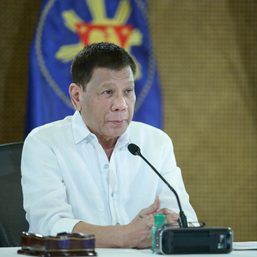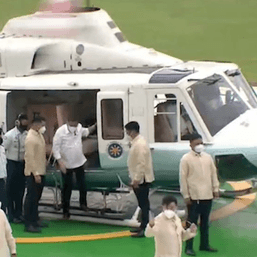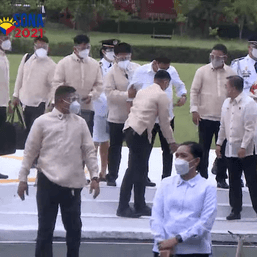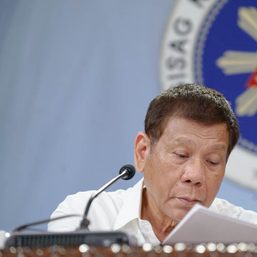SUMMARY
This is AI generated summarization, which may have errors. For context, always refer to the full article.
![[ANALYSIS] To protect Duterte, disclose his state of health](https://www.rappler.com/tachyon/2020/08/secrecy-rumors-governance-tl.jpg)
The beginning of the week swirled with rumors of an emergency medical flight to Singapore and an official supposedly crying in grief. The rumors caught fire when the President’s spokesperson used “perpetual isolation” in describing him in a statement.
By Monday night, August 17, the President’s men posted online a photo of him eating. Unfortunately, within hours several memes had cropped up. One of these photoshopped the newspaper headline used in the “proof of life” photo into the hands of historical figures – including the late comedian Dolphy.
This was just the latest in a series of “false alarms” regarding the President’s health. After all, how many times have we been treated to a “proof of life” selfie? And there lies the problem.
In a recent decision, the Supreme Court summarily dismissed a petition that asked the President to declare his state of health as required by the Article VII of the Constitution. One wonders, had the Supreme Court ruled differently and not as “overly deferential” (as one of the dissenting justices wrote), could it have broken this cycle of speculation and calmed the country?
The question still needs asking because we are in the midst of an unprecedented health crisis. We are also on the brink of what could be the worst economic collapse this country has ever seen. And if this nation is to have any chance of surviving this Perfect Storm, the least the administration can do is to be forthright.
There’s another reason. Every President eventually becomes a “lame duck.” When he becomes one is the question. Unfortunately for this administration, the COVID-19 pandemic, and the economic crisis we are facing, has accelerated the process.
That President’s assistants can still post selfies with him does not really answer the question of whether he is seriously ill or not. The uncertainty remains. Destructive speculation will continue. Secrecy as to the President’s actual state of health will only make the storm bigger.
History shows secrecy feeds rumors. And these rumors will not end. They will continue and they will hound an administration already on its last leg.
Under these facts, the traditional fear that officially admitting serious illness is a vulnerability should not prevail. Under these facts, disclosure turns weakness into strength. And while the Supreme Court may have missed its chance to quash it, the President’s men are still in a position to do so – by releasing a medical bulletin about the President’s health.
Price of uncertainty
Until they do so, you will have even the most loyal secretly weighing their options and arranging their political “transitions” instead of focusing 100% on the pandemic and its aftermath. The diligent will be paralyzed by indecision, not knowing whether a 2-year plan is worth it or not.
Uncertainty will have big business taking pause, if not slowly tightening the screws. The more adventurous (including certain Oligarchs) will – while offering smiling handshakes – be sharpening the knives for the next phase, if not for payback. Business does what it always does in order to survive.
Worst of all, uncertainty induces bad eggs in government to rush to make the most of their plunder, fearful that the “time” is coming and it might come sooner than later. Panic leads to mistakes, mistakes lead to scandals. And nothing chips away political capital faster than more scandals. Just ask PhilHealth.
Limiting opposition’s play
Disclosure of the President’s health does not just put rumor to rest, it removes distractions and provides the country a tentpole to unite under. Rather than backroom conversations on political survival, the core of government can focus on what can be done under the circumstances. The opportunists will leave but, those who stay are there to keep things intact and to ensure that a measured and orderly transition happens in the unlikely event that the worst comes to pass.
Finally for the zealots in the circle, disclosure tames the opposition. No politician wants to be that opportunist who puts ambition above the need to ensure stability and continuity of government in the midst of a historic health and economic crisis. Uncertainty gives them something to play up, disclosure limits their field of play.
With less than two years left, the worst way the current administration can handle a post pandemic scenario is to keep the public in the dark. It might sound trite, but honesty is the best weapon the administration can wield right now.
Those who truly value the President and his legacy should see that the benefits of disclosure outweigh its distractions. Those who believe in doing their best by the oaths they took should realize that, the true enemy of any administration is not the opposition but uncertainty.
And uncertainty during a time of crisis, can be its death knell. – Rappler.com
John Molo is a commercial law litigator who enjoys reading and learning about the Constitution and its intersection with politics. He teaches Constitutional Law at UP Law and chairs the Political Law Cluster. He is the President of the Harvard Law School Association of the Philippines, and a past Chairman of the IBP Law Journal. He led the team that sued the Aquino administration and invalidated the PDAF.
Add a comment
How does this make you feel?



![[OPINION] Presidential inability and its many forms](https://www.rappler.com/tachyon/2021/04/TL-presidential-inability-April-17-2021-sq.jpg?resize=257%2C257&crop_strategy=attention)

There are no comments yet. Add your comment to start the conversation.